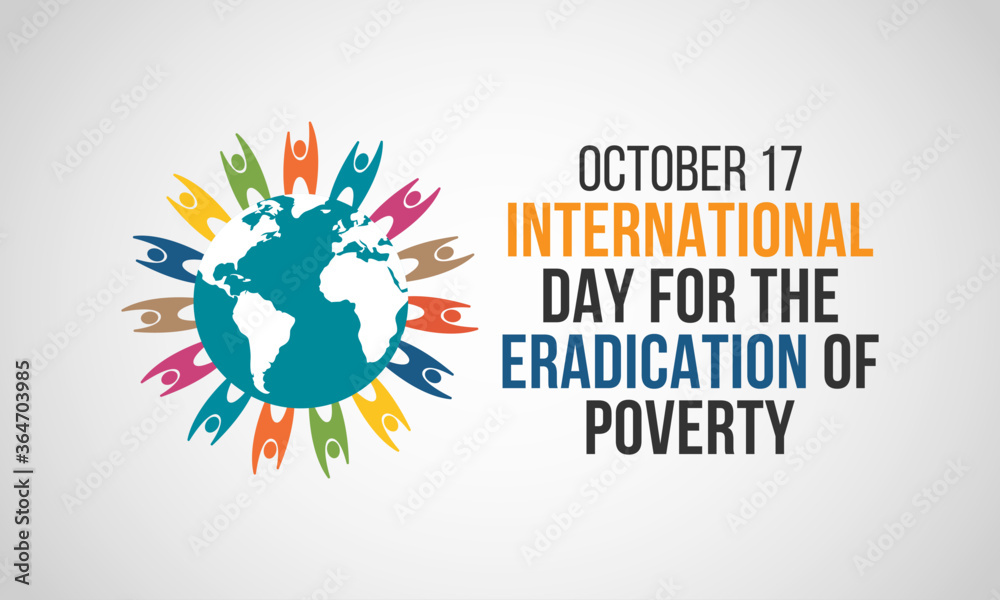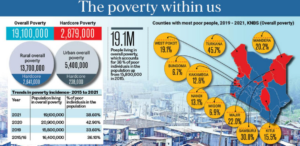
Dear Kenya, On This International Day for The Eradication of Poverty, Own and Drive the AfCFTA, EAC Promise
Poverty and Income Dynamics
While Kenya has the lowest economic inequality among its East African community neighbors, with 38.9 on the Gini Coefficient, Rwanda (43.7) Uganda (42.7), Tanzania (40.5), and Burundi (40.1), rising food and energy prices are likely to worsen the income inequality and poverty for the nation. As the world gathers to mark the International Day for the Eradication of Poverty Today, it is necessary to remind her of the significant strides she has made and the existing challenges in eradicating poverty and wealth distribution inequalities.
In the pursuit of economic development and social progress, Kenya stands at a crucial juncture. Critical in the fight against one of Kenya’s oldest enemies, is embracing cross-border trade under the African Continental Free Trade Area (AfCFTA) and within the East African Community (EAC). These initiatives hold the potential to transform Kenya’s economic landscape, foster sustainable development, and create a more equitable society.
Hunger Statistics
Worrying statistics indicate that 16% of Kenya’s population lives in poverty. In 2022, 16% of Kenya’s population lived below U.S. $1.90 per day which implied that over 7.8 million people lived in poverty, the majority of them in rural areas. The Kenya National Bureau of Statistics indicates that 30% of citizens are unable to meet their food needs with every 17 Kenyans living in abject poverty with 2.8 million of them classified as living in extreme poverty. The report further indicates that one in 13 rural dwellers is living in extreme poverty while one in 66 urban dwellers lived in extreme poverty in 2021. The implications are that one in three rural dwellers and one in four urban dwellers are unable to meet their daily food needs.

If the rising energy and food prices are anything to go by, the compounded adverse aftershocks of COVID-19, prolonged drought, shifting geopolitical realignments, conflicts, and protectionist policies warrant Kenya’s realignment to adequately feed her citizens. Kenya’s widening poverty gap is another stark reminder of scores slipping into poverty and the urgency to solve a growing crisis in the country.
Trade Agreement Opportunities
While the food and poverty situation in Kenya requires a multifaceted approach to slow down its impact, cross-border trade stands as a reminder of the possibilities of opening up the country to business within the region and beyond. Particularly, Kenya is well-positioned to benefit from cross-border trade facilitated by the AfCFTA and EAC. The agreements open doors to a vast and diverse consumer market, which is vital for the growth of Kenyan industries and businesses. For instance, with the AfCFTA promised to lift 30 million people out of extreme poverty with a $450 billion income boost by 2035, Kenya has to remain committed to facilitating trade with other nations. Access to a larger market with limited tariff and non-tariff barriers across Africa and in the EAC community offers a much-needed boost to local entrepreneurs and encourages foreign investments, which can stimulate job creation, increased income, and poverty reduction.
One of the most effective tools to combat poverty is job creation, and cross-border trade holds the key. The AfCFTA and EAC aspirations underscore a reduction in overall trade barriers and the strengthening of regional integration which hold potential for stimulating growth in the Kenyan economy. Enhanced trade fosters the expansion of existing businesses and the emergence of new ventures, leading to increased employment opportunities for Kenyan youth and adults alike. Moreover, the diversity of goods and services across borders presents opportunities for Kenya’s entrepreneurs to tap into regional markets, further boosting domestic production and job creation. The underlined potential for reduced unemployment enhances better income levels and directly impacts poverty reduction.
“With reduced barriers to entry and access to larger markets, Kenyan businesses can experiment with new ideas and business models.”
Agriculture is the backbone of Kenya’s economy, providing employment for a substantial portion of the population. Kenya’s agricultural sector accounted for 26% contribution to the nation’s GDP in the first quarter of 2023, an approximate of $6.12 billion with Kenya’s GDP at the time measured in market prices standing at $25.45 billion. Cross-border trade under the AfCFTA and EAC can revolutionize the agricultural sector. The reduced trade barriers make it easier for Kenyan farmers to access markets across the region, reducing post-harvest losses and improving market access. In the long run, this can lead to enhanced agricultural productivity, empower smallholder farmers, and improve food security for the nation which is a fundamental element in poverty reduction.
Investment in infrastructure is a necessary requirement in supporting the growth of cross-border trade. As the EAC and AfCFTA trading protocols take root, a renaissance in the development of roads, railways, ports, and other transportation networks can be expected within the region facilitating trade while improving access to marginalized regions. Better infrastructure reduces transportation costs, which is particularly beneficial for Kenyan exporters. Better connectivity of the country and with her neighbors can be expected to promote economic activities, and employment opportunities, and ultimately lead to a reduction in poverty where it persists in rural areas.
Cross-border trade is not solely about the exchange of goods; it is also a vehicle for the exchange of knowledge and technology. The modus Operandi of the AfCFTA and EAC underscores the need for the adoption of best practices from neighboring countries that would foster innovation and efficiency. This is particularly desirable for Kenya’s agricultural sector which lacks mechanization for value addition and the service sector where innovation can lead to the absorption of more youth into the workforce. Kenyan entrepreneurs and industries can learn from their regional counterparts and implement new technologies and business models, ultimately improving productivity and competitiveness.
One of the most compelling aspects of the AfCFTA and EAC is their commitment to inclusive growth. These agreements prioritize the involvement of vulnerable and marginalized communities in economic activities. By addressing the specific needs of disadvantaged groups and ensuring that benefits are shared equitably, they contribute to creating a more equal Kenya.
Cross-border trade fosters an environment that encourages entrepreneurship and innovation. With reduced barriers to entry and access to larger markets, Kenyan businesses can experiment with new ideas and business models. Successful entrepreneurs can create economic opportunities, reduce poverty, and inspire others to follow their path. Particularly, this caters to youth and women who often face barriers to entry in the traditional labor market. The AfCFTA and EAC offer platforms for youth and women entrepreneurs to participate in trade, empowering them to be economically self-reliant and contributing to poverty reduction.
Regional value chains and industrialization are integral to enhancing Kenya’s economy. By collaborating with neighboring nations within the EAC and across the African continent, Kenya can add value to its raw materials, diversify its economic base, and create jobs. Industrialization also makes the nation more resilient to external economic shocks, reducing the impact of poverty during challenging times.
Government Commitment
Kenya’s economic transformation is not a distant dream but an achievable reality. By fully embracing cross-border trade under the AfCFTA and EAC, Kenya can transform its economy, stimulating growth and prosperity. However, this transformation requires commitment from all sectors of society, from the government to civil society and the private sector.
The government plays a pivotal role in creating an enabling environment for cross-border trade. This involves reducing non-tariff barriers, investing in infrastructure, and fostering an environment that attracts foreign investments. Policies that promote inclusive growth and prioritize the participation of marginalized communities are essential.
As Kenya celebrates its achievements and contemplates its future on this International Day for the Eradication of Poverty, let us recognize that the power to transform our nation lies within our grasp. Embracing cross-border trade under the AfCFTA and EAC is not just an economic strategy; it is a moral imperative. It is a chance to uplift the less fortunate, to build a fairer society, and to create a brighter future for all Kenyans. This is our moment to shine; let’s seize it.




1 Comment
Title: Eliminating Poverty: A Call for Action in Tanzania and Africa
On this International Day to Eliminate Poverty, the call for African nations, including Tanzania, to step away from the blame game and forge a path of progress is resounding. Drawing a parallel with the histories of North and South Korea, both former British colonies that gained independence on the same day, Tanzania stands at a crossroads.
Comparing South Korea and North Korea
The divergence in fortunes between South Korea and North Korea offers a powerful lesson. The question arises: How did South Korea ascend to prosperity while North Korea continues to grapple with poverty? The answer is that what might seem like a miraculous transformation is, in fact, a result of sound economic strategies.
Tanzania’s Potential
Tanzania is a nation richly endowed with a wealth of natural resources, fertile land, stunning natural attractions, a peaceful environment, and strategic geographic positioning, surrounded by more than seven countries. Yet, the reality is that many of its citizens are struggling in the hope of miracles that could one day lift Tanzania out of its economic slumber.
Economic Lessons from South Korea, Hong Kong, and Singapore
The successes of South Korea, Hong Kong, and Singapore were not miracles but rather the result of deliberate economic strategies. African nations, including Tanzania, can take a page from their playbook. A transition towards more democratic governance and lighter entry regulations is essential. In the case of Tanzania, policies should be geared toward fostering an environment where entrepreneurial endeavors can thrive.
Eradicating Barriers
One of the key measures to drive economic growth is the elimination of unnecessary and costly regulations. Many countries, especially in Africa, have long been plagued by corruption and red tape, which have hindered economic progress. Tanzania must create an environment that promotes local and international trade. Government interventions should be focused on supporting entrepreneurship through smart policies that cut bureaucracy and encourage businesses to thrive.
Encouraging Entrepreneurship
A prosperous community doesn’t necessarily require free education, healthcare, or utilities. Instead, it necessitates programs that support entrepreneurship without distorting the market. Many well-intentioned government schemes often end up taking resources from where they could be best used to where they are not effective, essentially redistributing wealth rather than creating it.
Leadership for Progress
African leaders must recognize that their legacy will be shaped by their efforts to reduce poverty and improve the lives of their citizens. Effective leadership lies not in offering handouts but in lowering barriers to entry, supporting entrepreneurship, enhancing firm productivity, reducing corruption, and embracing technology to streamline business processes with minimal government interference.
Conclusion
On this International Day to Eliminate Poverty, Tanzania and other African nations must heed the lessons of history. Economic success is not a miracle; it’s a formula based on smart policies that encourage entrepreneurship and reduce barriers to business entry. The path to prosperity is clear, and it’s time for Africa to follow it. Strong leaders will be remembered for their role in breaking the chains of poverty and ushering in a new era of economic empowerment. It’s time for African nations to embrace this challenge and lead their people to a brighter future.